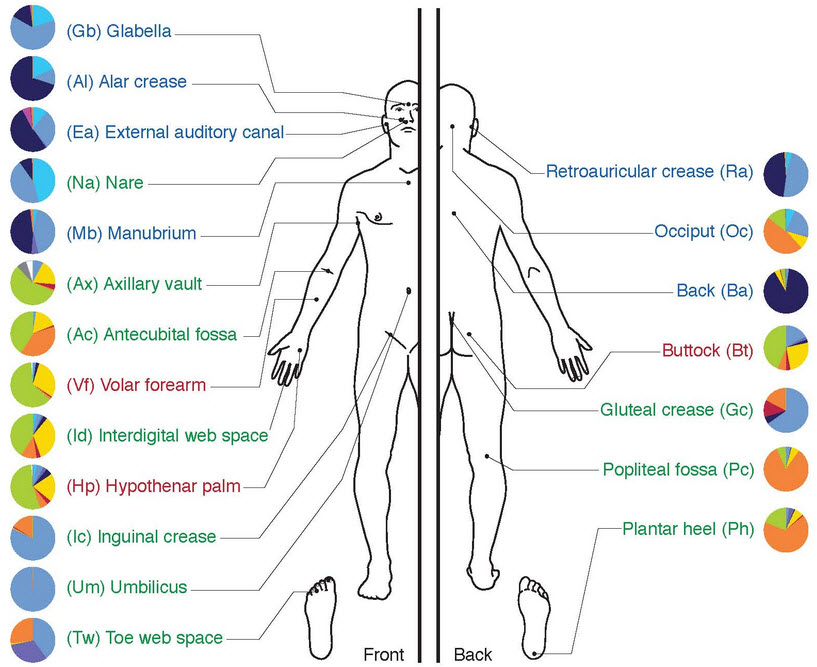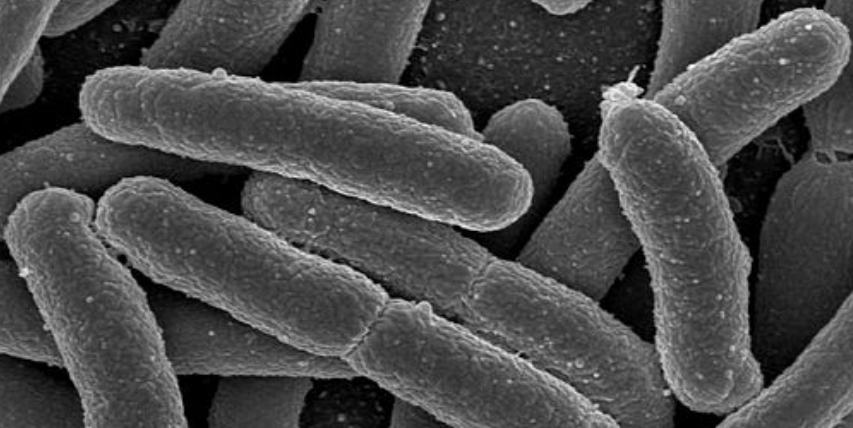Stalking the wild microbiome
January 31, 2013 by Amara D. Angelica

Bacteria that predominate in the human body (credit: National Human Genome Research Institute)
Did you know that foreign microoganisms outnumber our own cells by 10:1, and that we know almost nothing about how they affect our personal health?
Neither did I. But biotech startup µBiome, a UCSF Quantitative Biosciences Institute spinoff, hopes to fix all that by launching the world’s first citizen science effort to fully map the human “microbiome” (all the microbes in your body), using crowdsourced funding at indiegogo.
µBiome has raised an impressive $232,556 as of Wednesday night), but the project expires just before midnight Thursday Jan. 31.
I encourage you to check this out. (To deal with my own digestive problems, I just signed up for their $79 GI Microbiome kit — delivery: May 2013.)

The full microbiome analysis will be available with uBiome’s $1,337 Delta Five kit (credit: µBiome)
How to discover your microbiome
This may creep you out, but these microbes are all over your body — literally every inch of your skin and inside you.
However, these microbes are mostly not harmful, but rather are co-evolved symbionts, essential collaborators in our physiology, explains uBiome co-founder Jessica Richman, a Stanford grad and now DPhil student at Oxford University’s Internet Institute (also a co-founder of the #pdftribute movement).
“Like the rainforest, the healthy human microbiome is a balanced ecosystem. Recent research suggests that the correct balance of microbes serves to keep potential pathogens in check and regulate the immune system. Microbes also perform essential functions such as digesting food and synthesizing vitamins.”
As we’ve noted on KurzweilAI (see Related links below), studies have linked the microbiome to human mood and behavior, as well as many gut disorders, eczema, and chronic sinusitis.

Escherichia coli, one of the many species of bacteria present in the human gut (credit: NIAID/NIH)
“We have two aims with µBiome,” said co-founder Zachary Apte, who has a PhD in biophysics from UCSF. “First, we want to make the science and the technology available to everyone. Now anyone can have their microbiome sequenced. Second, we want to curate the world’s largest microbiome dataset.
“Citizen science is the answer. If you’d told me even five years ago that high throughput sequencing technology would be in the hands of citizen scientists, I would have told you that you’d been watching way too many science fiction movies. Today, uBiome makes this dream a reality.”
µBiome will be using techniques from the NIH’s $173 million dollar Human Microbiome Project to find out what microbes are living in your body, compare you to others, and keep you up to date on research that applies to your data.
Five Things Your Microbiome Can Tell You
1. Obesity. Ley et al (2006) and others have identified gut microbes associated with obesity, such as Eubacterium rectale. In addition, Upadhyay et al (2012) did experiments with mouse models and suggested the possibility that the microbiome could be manipulated for weight control in the near future
2. Dietary composition. Wu et al (2011) found that gut enterotypes were strongly associated with long-term diets, particularly protein and animal fat (Bacteroides) versus carbohydrates (Prevotella).
3. Antibiotics. If you have recently taken antibiotics, your gut microflora may not yet have been replenished. Dethlefsen et al (2008) found that ciprofloxacin treatment influenced the abundance of about a third of the bacterial taxa in the gut. Similarly, Jernberg et al (2007) found that long after the selection pressure from a short antibiotic exposure has been removed, there are persistent long term impacts on the human intestinal microbiota that remain for up to two years post-treatment.
4. Allergies. Is your nasal microbiome associated with the profile of chronic sinusitis? Abreu et al (2012) found that multiple, phylogenetically distinct lactic acid bacteria were depleted concomitant with an increase in the relative abundance of a single species, Corynebacterium tuberculostearicum, in patients suffering from chronic sinusitis.
5. Bacterial vaginosis. If you have a penis, your microbiome may be correlated with bacterial vaginosis in women. Price et al (2010) found that two families found in certain penis microbiomes — Clostridiales Family XI and Prevotellaceae — have been previously associated with bacterial vaginosis. This may correspond to frequent infections in your partner.